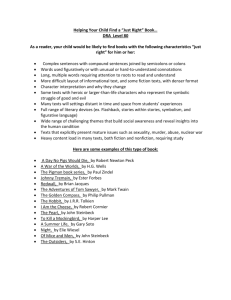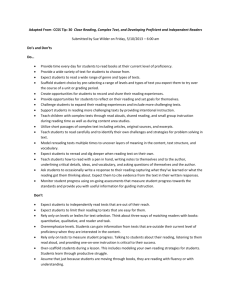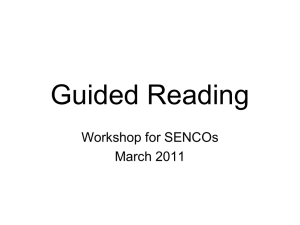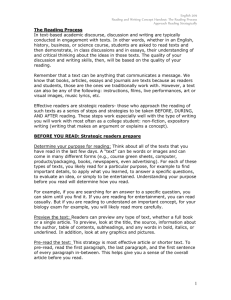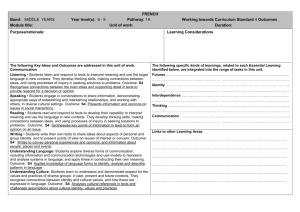BDA Disciplinary Perspectives Student Talk
advertisement
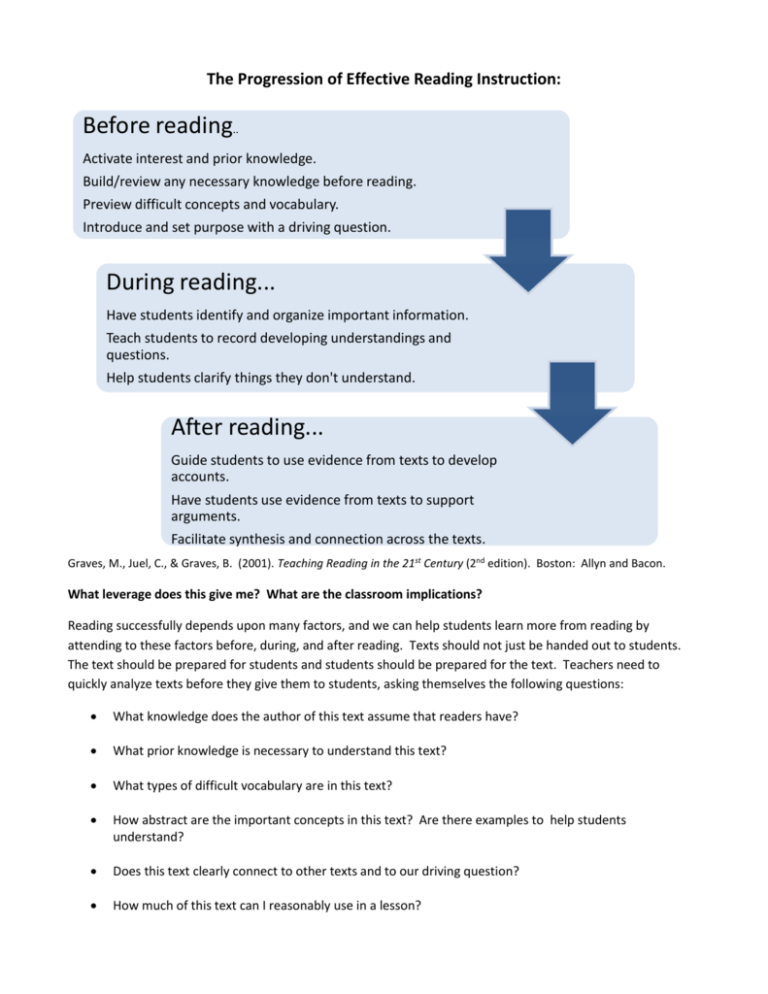
The Progression of Effective Reading Instruction: Before reading.. Activate interest and prior knowledge. Build/review any necessary knowledge before reading. Preview difficult concepts and vocabulary. Introduce and set purpose with a driving question. During reading... Have students identify and organize important information. Teach students to record developing understandings and questions. Help students clarify things they don't understand. After reading... Guide students to use evidence from texts to develop accounts. Have students use evidence from texts to support arguments. Facilitate synthesis and connection across the texts. Graves, M., Juel, C., & Graves, B. (2001). Teaching Reading in the 21st Century (2nd edition). Boston: Allyn and Bacon. What leverage does this give me? What are the classroom implications? Reading successfully depends upon many factors, and we can help students learn more from reading by attending to these factors before, during, and after reading. Texts should not just be handed out to students. The text should be prepared for students and students should be prepared for the text. Teachers need to quickly analyze texts before they give them to students, asking themselves the following questions: What knowledge does the author of this text assume that readers have? What prior knowledge is necessary to understand this text? What types of difficult vocabulary are in this text? How abstract are the important concepts in this text? Are there examples to help students understand? Does this text clearly connect to other texts and to our driving question? How much of this text can I reasonably use in a lesson? Using text is about more than reading! Read About Text Talk Write What leverage does this give me? What are the classroom implications? This one is easy… students need opportunities to read, talk, and write about text. Important caveat… students need to talk, not just the teacher. Importantly, they need to talk to each other about text and content. They should write frequently and informally as well, particularly to respond to texts, organize important ideas, and keep track of their thinking. This is so important it bears repeating.... We make our thinking visible by talking. Students need to have lots of structured opportunities to talk about what they read in order to develop their comprehension. Students should be talking more than the teacher about what they read! Students also need to have lots of structured opportunities to write about what they read. Most of the writing they do can and should be informal. Disciplinary Perspectives on Reading... how and what we read varies across content areas! For example... Effective readers of science: use texts to understand scientific phenomena read to understand why ideas are new or different from previous scientific thought pay attention to precise scientific definitions and terms rely on images and models to further their understanding look for specific claims and supporting evidence to support scientific ideas make predictions about other aspects of science based upon new information they read compare their observations of science phenomena to what they read Effective readers of history: consider the source of a text, as well as the context of its production and its intended audience look for evidence of bias or perspective consider multiple accounts, from different perspectives, of the same event or events compare multiple accounts to create new ones read across a range of documents and types of texts and also consider artifacts, data, and other information read to understand and analyze accounts of the past, not remember lists of names and dates read to sequence events as well as explore cause and effect relationships Effective readers of math: read to define and understand terms and concepts explore possible solutions to problems break down problems into steps, procedures, and/or operations needed to solve them determine what information is relevant to a given problem statement read to explore mathematical proofs for theories and concepts integrate words, numbers, and symbols to make meaning rely upon images, graphs, and other representations of mathematical information Effective readers in English Language Arts (when reading a novel): identify and develop characters attend to the interactions between characters and their relationships interpret and analyze dialogue to learn about characters interpret figurative language like metaphors and similes attend to sensory details and description that develop characters, setting, and mood look for emerging themes, morals, symbols, or other literary patterns use changes in language to determine when perspectives shift adapted from materials produced by the Strategic Literacy Initiative, WestEd., 2000







